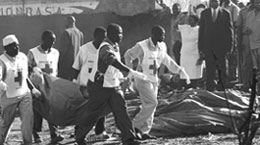
NAIROBI (IPS)–Kenyans are calling for their government to rethink its close military relationship with the United States, following last month’s terrorist attacks on Israeli interests on the Indian Ocean coast.
“Kenyans should not needlessly be killed, sacrificed, and then humiliated and demeaned for the sake of a contest in which they are not central players, and for which they are viewed as sacrificial lambs,” said the Kenya Human Rights Commission at a Dec. 10 news conference here.
Rights activists want the Kenyan government to “fully account to the people of Kenya the nature, extent and scope of its economic and military relationships with the West and Israel,” so that the people can decide whether they want to continue with these ties or break them off.
“We cannot simply sit here, year in, year out, endure attacks, endure incalculable losses, endure the damage to our nation’s prestige, our nation’ s economy, our nation’s image abroad, and do nothing about it,” complained Makau Mutua, chair of the Kenya Human Rights Commission, warning that further attacks are likely.
“If they have attacked us three times in the past, what is to prevent them from attacking us again? The attackers have decided that Kenya is a soft target. And so you can almost be certain that they will come calling again,” he predicted.
The attack on the Paradise Hotel near the Kenyan coastal city of Mombasa, in which 10 Kenyans and three Israelis died, was the third terrorist attack in as many decades.
More than 200 Kenyans died when the American embassy in the capital, Nairobi, was blown up in 1998.
Osama bin Laden and his al-Qaeda network have been accused of the Paradise Hotel suicide bombing. They are also accused of the 1998 attack.
In 1981, the Norfolk Hotel in Nairobi was subjected to a bomb attack. “It is important that we decide as a nation whether we can put up with relations that are costing deaths to Kenyans. The government should not just go to Washington and come back here and they don’t tell us what has been decided and before we know it, more people are killed,” said Willy Mutunga, Kenya Human Rights Commission executive director.
Kenyan President Daniel Arap Moi met his American counterpart George W. Bush in Washington, where they discussed, among others, war on terrorism.
“We want to participate. We want to be part of choosing who our friends are, who our enemies are,” said Mr. Mutunga.
Both the Kenyan government and the U.S. embassy are cagey about the details of their military relations, citing security reasons. The United States disingenuously describes its Kenyan military bases, used in the 1991 Gulf War against Iraq and the 1993 American-led Operation Restore Hope in Somalia, as mere “facilities.”
U.S. marines and Kenyan soldiers recently carried out joint military exercises on Manda Island, close to the Kenyan-Somali border. A similar exercise took place in the same location in February.
“Exercise Edged Mallet involves an exchange of tactical knowledge based on the unique terrain and conditions found along the Kenyan coast,” said the U.S. Embassy in Nairobi.
U.S. officials say the exercise aims to “further refine and strength the already robust military-to-military relationships between the U.S. and Kenya.”
Kenyans are frustrated by the United States’ failure to tackle the root causes of the terrorist attacks, what Kenya Human Rights Commission characterizes as “a civilizational contest between the West and the Islamic world.”
There is a deep sense of anger within the Islamic world towards U.S. foreign policy–the threat of a looming war to oust Saddam Hussein from Iraq, last year’s campaign against Afghanistan and the blatantly partisan U.S. support for Israel in its war with the Palestinians.
The Islamist website reportedly said the attacks on the Paradise Hotel were targeted at “the Jewish and Crusader occupiers.”
Before al-Qaeda was accused of the attacks, the previously unheard of Army of Palestine said it was behind the bombings.
“You have to go back to the root causes. The two sides have to discuss what those problems are that divide them and then seek to address them,” said Mr. Mutua.
“It is not enough to simply launch a military campaign every time there is a bomb attack or a suicide attack. You cannot simply respond to every attack by dropping bombs on people. That may just end up producing more Osama bin Ladens,” he warned.Kenyans have also been angered by the way their investigators have been sidelined by incoming U.S. Federal Bureau of Investigation and Israeli Mossad secret service bomb experts.
There has been tension between the three investigating teams, with the Israelis insisting that they take key pieces of evidence from the Paradise Hotel bomb blast site back to Israel for forensic examination.
Mr. Mutua said one Israeli investigator criticized the Kenyan experts as “no good,” saying, “They only smile at you.”
“We cannot allow the honor of this country to be besmirched by outsiders, and we cannot allow outsiders to cast racist aspersions on our security forces,” he said.
The Kenyan press has also reported that Western intelligence agencies had information about possible attacks on Kenya which they did not share with their Kenyan counterparts.
“Western and Israeli intelligence and investigative services treat their Kenyan counterparts as lazy, incompetent, untrustworthy, subhuman, childish and stupid,” said the Kenya Human Rights Commission.
“The Kenyan state cannot allow this country to be treated in such a humiliating and demeaning manner by its ‘allies’ and ‘friends.’ To do so is an unforgivable failure to protect its citizens and the nation’s honor,” it charged.
The Kenya Human Rights Commission said Israel and the United States have a moral obligation to compensate the Kenyans who died in the Paradise Hotel bombing.












